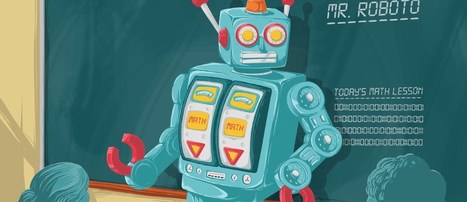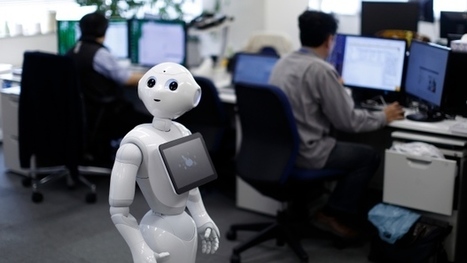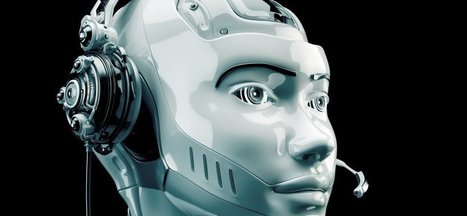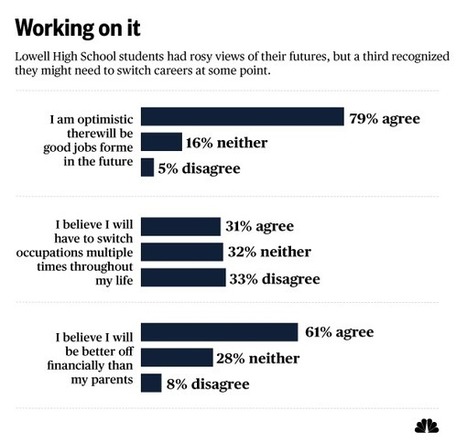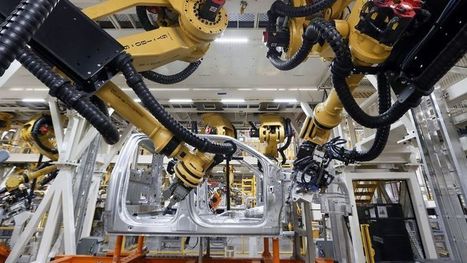 Your new post is loading...
 Your new post is loading...

|
Scooped by
John Evans
|
“What do you want to be when you grow up?”
When I was a kid, I dreaded the question. I never had a good answer. Adults always seemed terribly disappointed that I wasn’t dreaming of becoming something grand or heroic, like a filmmaker or an astronaut.
In college, I finally realized that I didn’t want to be one thing. I wanted to do many things. So I found a workaround: I became an organizational psychologist. My job is to fix other people’s jobs. I get to experience them vicariously — I’ve gotten to explore how filmmakers blaze new trails and how astronauts build trust. And I’ve become convinced that asking youngsters what they want to be does them a disservice.

|
Scooped by
John Evans
|
There is a lot of talk these days about robots replacing humans in the workforce, but those conversations remain largely abstract. For students in school today, however, the issue is urgent, research shows. What if the job they aspire to today is no longer an option when it comes time to graduate? How can they train for jobs that don’t even exist yet?
On the other side of that equation are educators, who often draw from their own learning experiences in K-12 and higher education to inform their instruction. What responsibility do they have in preparing today’s students for a future none of them can really envision?
EdSurge recently sat down with Karen Cator, the CEO of Digital Promise, to get her take. Cator is a former director of the U.S. Department of Education’s Office of Educational Technology who has been championing digital learning since long before the term “digital learning” was being thrown around—back when she was still a classroom teacher in Alaska. Of all the issues and trends in edtech these days, she says automation is one of the most pressing—and one that all educators should be thinking about.

|
Scooped by
John Evans
|
"I have four kids, ages 5 to 14, and I and know they’re very unlikely to follow the same educational path I did. I’m certain they’ll be preparing themselves for a very different job market. As my youngest is in kindergarten and my oldest just started high school, here are my thoughts for them.
Technology’s impacts are varied and yet to be determined. We like technology when it makes our daily lives easier and often more fun. But on the flip side, we worry. It’s natural to look toward the future and wonder what change will bring. Earlier this year, for example, Gallup found that nearly eight in 10 Americans believe artificial intelligence (AI) will destroy more jobs than it creates over the next decade. I believe the impact of AI will be much less significant than most predictions, but at the same time want to help people look ahead, eyes wide open.
Drawing on my time as co-chair of the World Economic Forum’s (WEF) Global Future Council on Education, Gender and Work, I’ve tried to distill some of the Council’s most important research into advice for my children as they gradually age their way into the workforce.
Here’s what I’m telling them and why:"

|
Scooped by
John Evans
|
Chances are your job description has changed over the past five years. Or maybe your role didn’t even exist a short time ago. The workplace of today and the future looks quite different due to technology, the economy, the environment, and politics, according to the Institute for the Future (IFTF), a not-for-profit think tank that helps organizations plan for the future.
The evolving workplace is creating a skills divide, says Adam Miller, CEO of Cornerstone, a talent management software and systems provider that partnered with IFTF to create a future skills study. “We have a very large group of jobs that require relatively few high-level skills, and a lot of those jobs will become obsolete in the future, being automated away,” he says. “On the flip side, highly technical jobs are wide open because there aren’t enough people with the skills to fill them. Whether or not employees recognize it, the half-life of their skills is shorter than it used to be.”
If you want to compete and stay relevant in the marketplace, you’ve got to master five “super skills,” according to IFTF:

|
Scooped by
John Evans
|
The following is an excerpt from GigaOm publisher Byron Reese’s new book, The Fourth Age: Smart Robots, Conscious Computers, and the Future of Humanity. You can purchase the book here.
The Fourth Age explores the implications of automation and AI on humanity, and has been described by Ethernet inventor and 3Com founder Bob Metcalfe as framing “the deepest questions of our time in clear language that invites the reader to make their own choices. Using 100,000 years of human history as his guide, he explores the issues around artificial general intelligence, robots, consciousness, automation, the end of work, abundance, and immortality.”
One of those deep questions of our time:
When the topic of automation and AI comes up, one of the chief concerns is always technology’s potential impact on jobs. Many fear that with the introduction of wide-scale automation, there will be no more jobs left for humans. But is it really that dire? In this excerpt from The Fourth Age, Byron Reese considers if there are jobs that will never be automated.

|
Scooped by
John Evans
|
Over the past five years students in some parts of the world have been greeted in their classrooms by teachers who appear to have come off the set of a George Lucas movie.
Robots have been teaching classes in Japan, South Korea and Abu Dhabi.
Throughout the world humans in various jobs are being replaced by robots at an ever-accelerating pace. The question for many people is whether their work will disappear with the rise of the machines.
Most think not.

|
Scooped by
John Evans
|
Coding is, apparently, the new language we all need to learn. It's billed as essential by the likes of Bill Gates and Stephen Hawking.
General Motors CEO Mary Barra calls coding a "core skill" that you need to learn if you want a high-paying job.
But what if this emphasis on coding is distracting us from teaching kids about other, more important things that they'll actually need for the jobs of the future?
Marina Gorbis, executive director of the Institute for the Future, sees this obsession with coding as the equivalent of putting all our eggs into one basket.

|
Scooped by
John Evans
|
Since as early as the 1800’s, fears of robots taking over human jobs has been a reality. As we enter the true age of robotics, those concerns are resurfacing, and educators are unsure about what jobs their students will be competing for. For example, IT jobs will grow by 22% through 2020 and jobs in STEM are said to see similar growth. Educators are expected to equip their students with skills that will translate into careers and yet they have no idea what these skills should be. While timeless skills such as critical thinking, languages and mathematics aid in every career they do not provide the specialized skills that “jobs of the future” may require. So, what are the jobs of the future and how can be best prepare students for them?
|

|
Scooped by
John Evans
|
Job openings are popping up all over, but there’s a handful of roles that top rankings across Canada and across a variety of industries in terms of the sheer volume of “wanted” ads, according to research by human resources giant Randstad.
Here are the top 10 most sought-after jobs:

|
Scooped by
John Evans
|
Newark, Del.
It's no secret that American workplaces are becoming more reliant on technology.
But what may surprise the country's K-12 educators and policymakers is how work at nearly every rung of the employment ladder is becoming more digitized. Often, the skills needed to succeed have less to do with computer programming than what experts call "digital literacy"—the ability to interpret, create, and strategically use digital information.
"Everyone's job is changing," said Mark Muro, a senior fellow and policy director at the Brookings Institution, a think tank. "The ability to read and then conduct first-order analysis of digital information is highly valued in almost all work environments."
To better understand the central role of digital literacy in the workplace, Education Week took a deep look at four occupations in the Christiana Care Health System. It's the largest private employer in Delaware, with 11,600 employees and an expected 1,500 new hires this year.

|
Scooped by
John Evans
|
"I have four kids, ages 5 to 14, and I and know they’re very unlikely to follow the same educational path I did. I’m certain they’ll be preparing themselves for a very different job market. As my youngest is in kindergarten and my oldest just started high school, here are my thoughts for them.
Technology’s impacts are varied and yet to be determined. We like technology when it makes our daily lives easier and often more fun. But on the flip side, we worry. It’s natural to look toward the future and wonder what change will bring. Earlier this year, for example, Gallup found that nearly eight in 10 Americans believe artificial intelligence (AI) will destroy more jobs than it creates over the next decade. I believe the impact of AI will be much less significant than most predictions, but at the same time want to help people look ahead, eyes wide open.
Drawing on my time as co-chair of the World Economic Forum’s (WEF) Global Future Council on Education, Gender and Work, I’ve tried to distill some of the Council’s most important research into advice for my children as they gradually age their way into the workforce.
Here’s what I’m telling them and why:"

|
Scooped by
John Evans
|
I recently received an infographic entitled "10 Common Jobs Which Won't Exist in 20 Years Time." I've reproduced the infographic, which was originally posted on LottoLand, a U.K.-based company that has something to do with gambling, at the end of this post.
The infographic is mostly a collection of conventional wisdom about jobs that are becoming obsolete. As usual, conventional wisdom is often wrong, so I've listed out the jobs below and provided my own perspective.

|
Scooped by
John Evans
|
"In the face of something like automation, the people-facing jobs are the ones that are going to stay. So we urgently need to equip young people with those skills — critical thinking, problem-solving and communica"

|
Scooped by
John Evans
|
Invasion. Takeover. These are the kind of words that have been bandied about in news headlines about robotics and artificial intelligence in the last few years. The coverage has been almost relentlessly negative, focusing on the threat to jobs, squeezing out the human component. While such potential is there, if robotics and AI do become a threat, then we believe this would be a threat of society’s own choosing.
According to a study from Oxford University and the Oxford Martin School, 47% of jobs in the United States are "at risk" of becoming "automated in the next 20 years." PwC has similar findings, estimating that 38% of U.S. jobs are at risk of being replaced by robots and artificial intelligence in the next 15 years. And while two-thirds of Americans believe robots will take over most of the workforce in the next 50 years, they're also in denial: 80% say their job will "probably" or "definitely" be around in five decades.
Here are five robots that are coming to take some jobs from unsuspecting humans:
Via Marc Wachtfogel, Ph.D.

|
Scooped by
John Evans
|
WHEN I ASK people to picture a coder, they usually imagine someone like Mark Zuckerberg: a hoodied college dropout who builds an app in a feverish 72-hour programming jag—with the goal of getting insanely rich and, as they say, “changing the world.”
But this Silicon Valley stereotype isn’t even geographically accurate. The Valley employs only 8 percent of the nation’s coders. All the other millions? They’re more like Devon, a programmer I met who helps maintain a security-software service in Portland, Oregon. He isn’t going to get fabulously rich, but his job is stable and rewarding: It’s 40 hours a week, well paid, and intellectually challenging. “My dad was a blue-collar guy,” he tells me—and in many ways, Devon is too.
|
 Your new post is loading...
Your new post is loading...
 Your new post is loading...
Your new post is loading...












